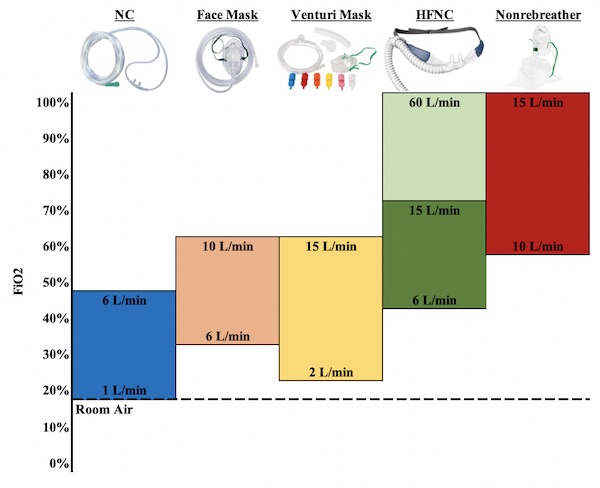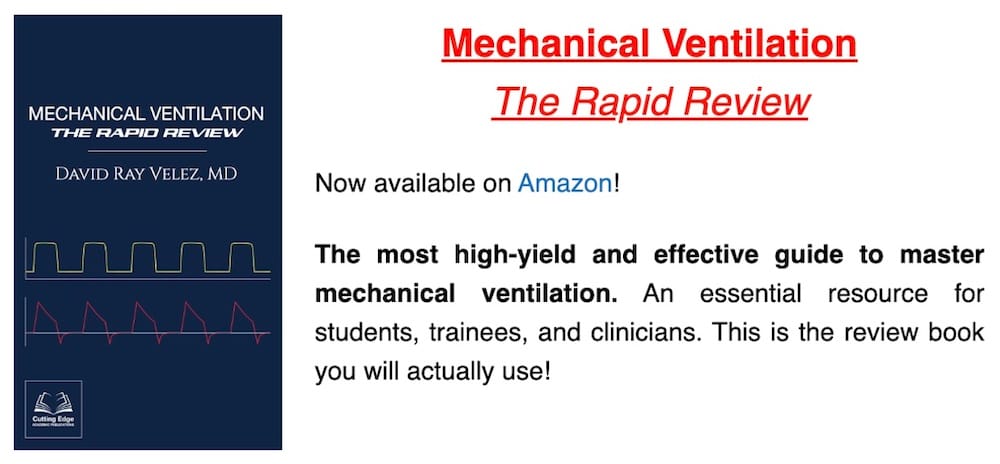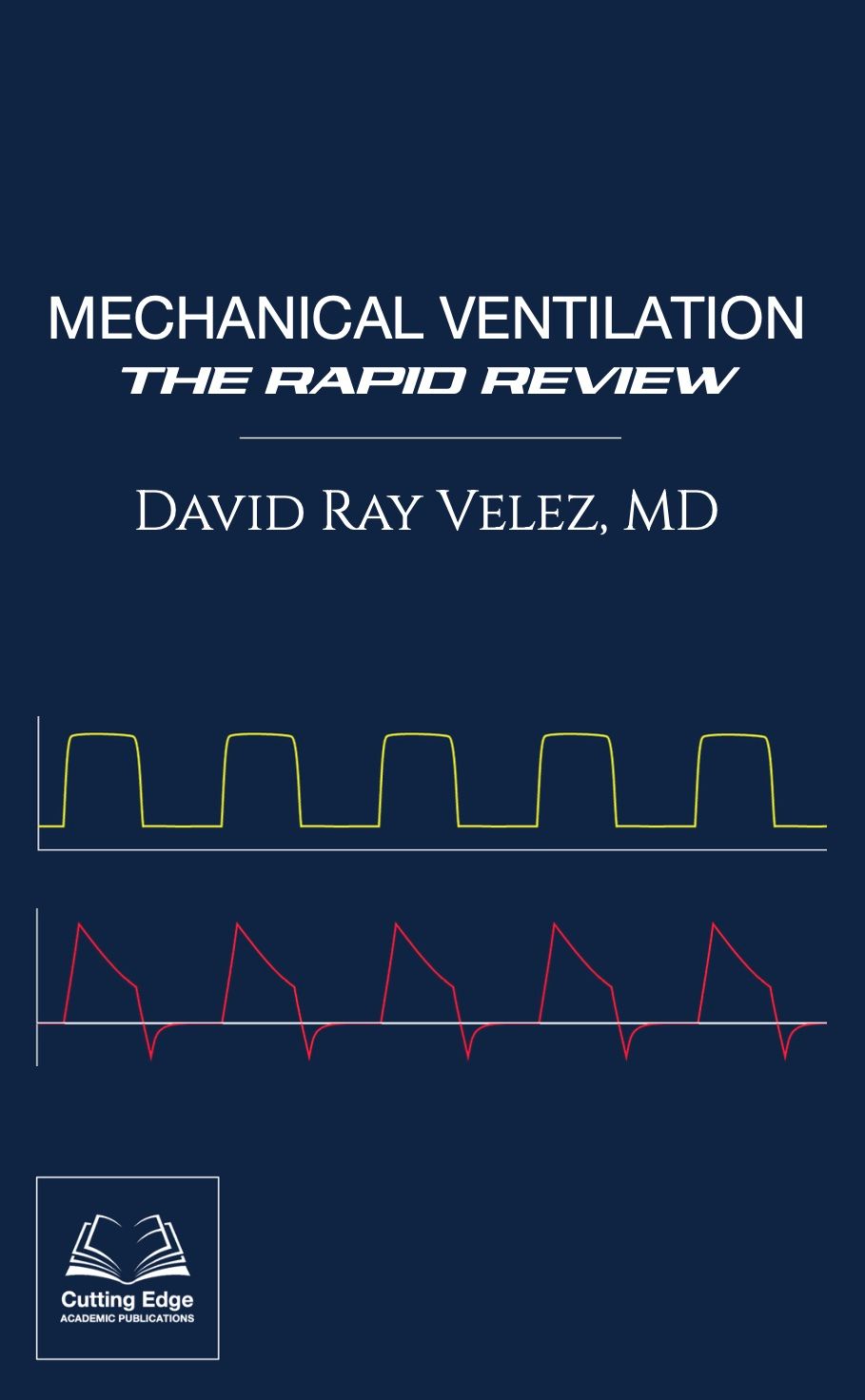Supplemental Oxygenation
Supplemental Oxygenation
David Ray Velez, MD
Table of Contents
Definitions
Low-Flow Systems
- Definition: Provides Oxygen at Flow Rates Below the Patients Inspiratory Demand
- Room Air is Therefore Entertained (Mixed) and Dilutes the FiO2
- Exact FiO2 is Extremely Variable
- Systems:
- Nasal Canula (NC)
- Simple Face Mask (Oxygen Mask)
- Venturi Mask
- Nonrebreather Mask
High-Flow Systems
- Definition: Provides Oxygen at Flow Rates that Meet the Patients Inspiratory Demand
- Entertainment of Room Air is Minimal with Less Dilution of FiO2
- Exact FiO2 is Generally More Reliable
- Systems:
- High-Flow Nasal Cannula (HFNC)
- Mechanical Ventilator
- Rebreather – Used in Scuba Diving but Not Medical Practice
Systems
Room Air
- FiO2: 21% (Regardless of Altitude)
- Other Contents:
- 78% Nitrogen
- 1% Other Trace Gasses (CO2, Hydrogen, Neon)
- Aerosols – Tiny Nongaseous Particles (Dust, Pollen, etc.)
Nasal Canula (NC)
- The Most Common Device Used
- Simply Provides Increased Flow of Oxygen Through Tubes into the Nostrils
- Flow Rates: 1-6 L/min
- Rates Over 6 L/min Dry Mucous Membranes and Are Uncomfortable
- Supplemental FiO2:
- 1 L/min: 24%
- 2 L/min: 28%
- 3 L/min: 32%
- 4 L/min: 36%
- 5 L/min: 40%
- 6 L/min: 44%
- *Adds Approximately 4% FiO2 Per Additional L/min of Flow
Simple Face Mask (Oxygen Mask)
- Flow Rates: 5-10 L/min
- Supplemental FiO2:
- 6 L/min: 35%
- 7 L/min: 41%
- 8 L/min: 47%
- 9 L/min: 53%
- 10 L/min: 60%
Venturi Mask
- Flow Rates: 2-15 L/min
- Different Sized (Colored) Ports Change the Flow Rate and FiO2 Provided
- Allows Precise Measurement of Delivered FiO2
- Often Used in Obstructive Lung Disease When Exact Oxygen Delivery is Important to Not Over-Oxygenate
- Supplemental FiO2:
- Blue Valve (2 L/min): 24%
- White Valve (4 L/min): 28%
- Orange Valve (6 L/min): 31%
- Yellow Valve (8 L/min): 35%
- Red Valve (10 L/min): 40%
- Green Valve (15 L/min): 60%
Nonrebreather Mask
- A Low-Flow Device with High FiO2
- Flow Rates: 10-15 L/min
- Reservoir Bag is Used to Deliver Higher FiO2
- One-Way Valve Prevents Inhalation of Previously Expired Air
- Supplemental FiO2:
- 10 L/min: 60-80%
- 15 L/min: 95-100%
- Rebreather – Used in Scuba Diving but Not Medical Practice
- Mask with a Reservoir but No One-Way Valve
- Expired Air Dilutes the Inspired Oxygen
- Although Considered “High-Flow” the FiO2 is Much Lower than Nonrebreather Masks
- Mask with a Reservoir but No One-Way Valve
High-Flow Nasal Cannula (HFNC)
- Adds Humidity and Heat to Allow High Flow Rates (Up to 60 L/min)
- Additional Advantages:
- Reduced Anatomical Dead Space
- Provide Small Amount of CPAP/PEEP (4-5 cm H2O)
- Minimizes Mixing of Room Air – Increased FiO2 is More Reliable
- Some Evidence Suggests HFNC May Be More Effective than Standard Oxygen Supply Devices (Nonrebreather)
- Supplemental FiO2:
- 6 L/min: 47%
- 10 L/min: 59%
- 15 L/min: 70%
- 25 L/min: 83%
- 60 L/min: 100%

Supplemental Oxygenation
Clinical Use
General Target Values
- SaO2/SpO2: > 92% (88% in COPD or ARDS)
- PaO2: > 60 mmHg (55 mmHg in COPD or ARDS)
- ScvO2: > 70%
Step-Up Approach
- Generally Begin with Low-Flow Systems and Advance as Necessary
- Start with Nasal Cannula (The Most Widely Used and Rapidly Available)
- If Nasal Cannula is Insufficient: Step Up to a Nonrebreather Mask
- Face Mask Only Provides Minimal Improvement in FiO2
- Venturi Mask Also Only Provides Minimal Improvement in FiO2 and is Generally Used in More Specific Scenarios
- If Low-Flow Systems are Insufficient: Step Up to a High Flow System
- High-Flow Nasal Cannula Can Potentially Avoid Intubation
- Consider Intubation and Mechanical Ventilation if Indicated
Supplemental Humidity
- Problems with Dry Air:
- Can Cause Inflammation and Damage, Increasing Airway Resistance
- Less Comfortable
- Increased Water Loss
- Decreased Mucociliary Clearance
- Adjuncts:
- Supplemental Humidity – Can Be Connected to Any Flow Meter to Provide Moisture
- Opening Mouth – Can Also Add Humidity


